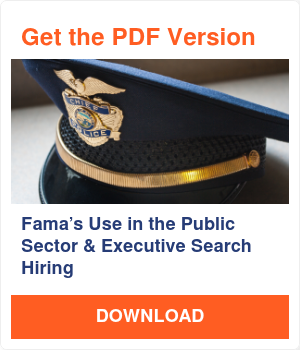Fama’s Use in the Public Sector & Executive Search Hiring

Executive Summary
3Sixty Insights spoke with Gary Peterson, President & CEO of Public Sector Search & Consulting, Inc., based in Sacramento, CA. Peterson’s firm performs national searches for high-level public safety leaders, such as police and fire chiefs.
As a former police chief, Peterson retired from the Martinez, CA, police force in 2014 and moved into the private sector with a search firm in Rockland, CA. He had no intention of opening his firm, but after feeling he could independently take his community-engaged approach to executive search, he started his own business. Peterson now employs a staff of five fellow ex-police chiefs from cities across the United States.
Together with their team’s attorney, he and his team have worked with over 20 major US cities and major universities, doing hundreds of candidate searches. Founded on the premise that public safety executive searches must be more efficient, innovative, and community-driven, the team uses its networks to foster community-engaged executive searches and background checks.
Peterson is especially concerned about the optics of policing, mainly due to recent headlines and institutional issues that have eroded community trust and hurt recruitment numbers. He knows that people they hire need not have drunk the Kool-Aid about cops being untouchable. “We don’t want a bad cop to be hired in one of our searches,” he told 3Sixty.
Relationship with Fama
Peterson came across Fama shortly after starting his business. Around this time, a notable police chief was fired due to an inappropriate social media post. Peterson heard through the grapevine that it was time to step up sourcing processes and use technology to conduct more thorough executive searches for these roles.
Although he initially disliked the restrictions on search options while trying to gather extensive information, Peterson’s use of Fama quickly evolved. “Using it is super easy,” Peterson jokes. “It’s almost like they made it for cops.” After one 60-90 minute training session, everyone on his team knew how to access and use the platform.
Social media searches were the first indicator to Peterson that Fama was a powerful solution. In one of his searches at this time, he had a highly qualified candidate, and Fama returned a 60-page social media report that included the public case files. In that report, two instances where the candidate was involved in litigation were flagged. Peterson used this information to open up a dialogue with the candidate to clarify the context and clear up any apprehension about moving her along in the candidate process.
Eventually, the firm came to use Fama’s 360 enhanced screening capabilities. This includes additional resources like social media records and court records as well as a Fama investigator who looks at the pulled information and highlights misconduct instances. Peterson and his team sift through the report to remove any guesswork for their clients. Peterson says they don’t want the Fama report to be taken as gospel but as reliable information they can use to investigate further and cross-check with the candidate in question. Given the decades of experience between them, Peterson wants clients to trust his team’s expertise over everything else.
A prime example of the firm’s use of Fama is illustrated by a recent search they conducted for a ‘top 10 city’ in the US that had over 20 potential candidates for a role. All the candidates were evaluated with Fama, saving them what would have been days of work. Fama helped uncover several issues their client was unaware of despite the individuals being the client’s existing employees. Fortunately, there were no significant flags, and any minor issues were identified, contextualized, and addressed.
Using the Platform
To use Fama for executive searches, Peterson or his team input basic information such as first name, last name, and location and then attach a CV that the system can use to extract job history. To ensure consent, the firm sends out a notice that informs candidates that Fama will be used as part of their background check. Fama also provides a consent form option as well.
While the turnaround time for these comprehensive executive-level 360 report queries is three to five days, it takes only a few minutes to input the information required to perform a search on someone. For a basic social media search, Fama Plus, the report is returned almost instantly.
Before Fama, conducting a search equivalent to a 360 Fama report was a significant undertaking that involved Googling, LexisNexis, and more. Peterson had to manage all the data himself to ensure that it was collected accurately. Just the process of inputting the information for a single candidate could take up to two hours. With Fama, the firm managed to input information for eight candidates in less than 10 minutes, and the 360 reports returned in about a week. Such a project wasn’t even a serious consideration before Fama.
In one of Peterson’s recent 10-candidate searches, one candidate had more than 100 news articles mentioning his name because he’s a high-profile individual working in a major city. That level of granularity takes time to sort through, and Fama has given him extra time for a more thorough review.
“It’s a force multiplier, and I have more time to do other things, whether that’s creating business for us or me getting to play golf on a Tuesday,” Peterson says
“It’s a force multiplier, and I have more time to do other things, whether that’s creating business for us or me getting to play golf on a Tuesday,” Peterson says. “What’s unfair to the candidates, more often than not, isn’t the research that’s done; it’s the lack of follow-up by a recruiter to verify, debunk, or understand what it is,” says Peterson. “If you’ve been in a high-profile job, there will be negative articles, and some cities cannot withstand the effort and scrutiny required to comb through that information.”
Regarding the impact on transparency, Peterson believes his use of Fama resonates with his clients. “They like that because part of the reason is it’s independent. And even though we’re a search firm and believe in reform and trying to find the best candidates, technically, someone could look at us and say, ‘Well, you have self-interest in placing those candidates and getting paid.’ If you have a third party doing that type of work, it kind of takes us out of it.”
“Even though we’re a search firm and believe in reform and trying to find the best candidates, technically, someone could look at us and say, ‘Well, you have self-interest in placing those candidates and getting paid.’ If you have a third party doing that type of work, it takes us out of it.”
Future Plans
While Peterson would like Fama to provide more context with the data they flag and the option to flag positive “green flags” or articles that back up claims from a CV, he thinks Fama is “an extraordinary product.” He uses Fama’s reports as intended—with a human in the loop—and believes that someone with his level of experience will always play a role. He remained adamant: “Fama is helpful, comprehensive, and I don’t know another company that leverages social media in this way,” he told 3Sixty Insights.
Conclusion: The Future of Behavioral Intelligence in Hiring
The evolution of AI-powered misconduct screening is upon us, and it’s positioned to permanently change how candidates are found, vetted, and hired.
As behavioral intelligence becomes more robust, its ability to uncover nuanced traits like interpersonal skills, decision-making abilities, and alignment with organizational values, which are often missed in resumes and interviews, will become increasingly accurate. By proactively identifying warning signs of misconduct, organizations can prevent widespread cultural erosion before it begins.
The role of behavioral intelligence in creating safer, more reliable workplaces starts with AI as a predictive tool. AI already provides predictive modeling capabilities to proactively identify candidate misconduct likely to impact company culture and performance, reducing negligent hiring risks. Organizations under stress experience misconduct at twice the rate of those without such pressures, meaning gradual year-over-year changes can make a tremendous difference in the long run.
The future outlook and regulatory trends for this technology are geared towards increased regulatory scrutiny of AI-driven behavioral intelligence practices. Forward-thinking organizations must anticipate these changes, focusing on ethical deployment, transparent communication, and compliant data handling to avoid potential issues with discrimination, privacy violations, and negligence in online screenings. Organizations must also look for compliant providers to ensure compliance with laws such as the Fair Credit Reporting Act (FCRA) and focus on transparency, consent, privacy, and fairness in their screening practices. They must also establish clear policies and provide ongoing training to navigate these complexities responsibly.
Also, with AI already well-positioned to enhance, rather than replace, HR functions, there should be a continuous emphasis on collaboration between technology and HR professionals. AI can automate repetitive administrative HR tasks, freeing professionals to focus strategically while providing data analytics for more informed decision-making, but human judgment remains essential for managing biases, ethics, and nuanced insights. When effectively paired with behavioral intelligence software, organizations can predict workplace behavior more accurately and make more informed hiring choices, paving the way for long-term organizational health and a more productive future.
About Fama
Fama makes hiring great people easy. Our modern candidate screening solutions use online signals to identify candidate fit. We highlight professional attributes such as creativity, innovation, and problem solving while also surfacing costly misconduct such as violence, harassment, and fraud.
We help organizations answer the big question: how might a candidate act around coworkers or customers when they join?
Talent teams use Fama to improve candidate quality and employee retention, create safe and inclusive workplaces, and place the right leadership for their organizations.
Fama is compliant with the FCRA, GDPR, and integrates into a wide range of HRIS, ATS, and background screening solutions.
Founded in 2015, Fama is headquartered in Los Angeles, California. We’re backed by some of the world’s leading investors, and have raised more than $30M. Learn why over 3,600 companies trust Fama at www.fama.io.
Get the Newsletter
Recent Blog Posts

New FCA Guidance for Non-Financial Misconduct: What Firms Need to Know






.png)



